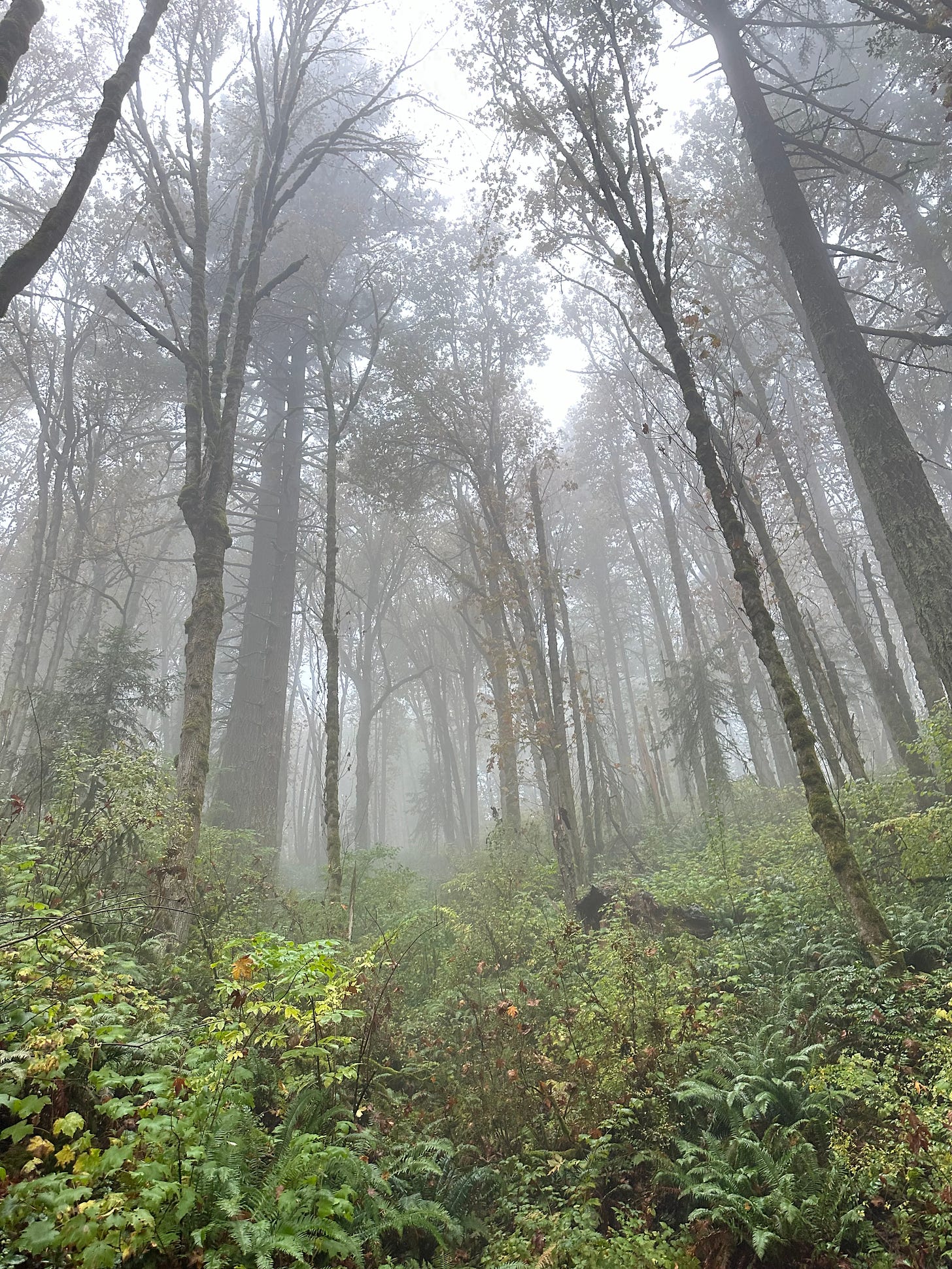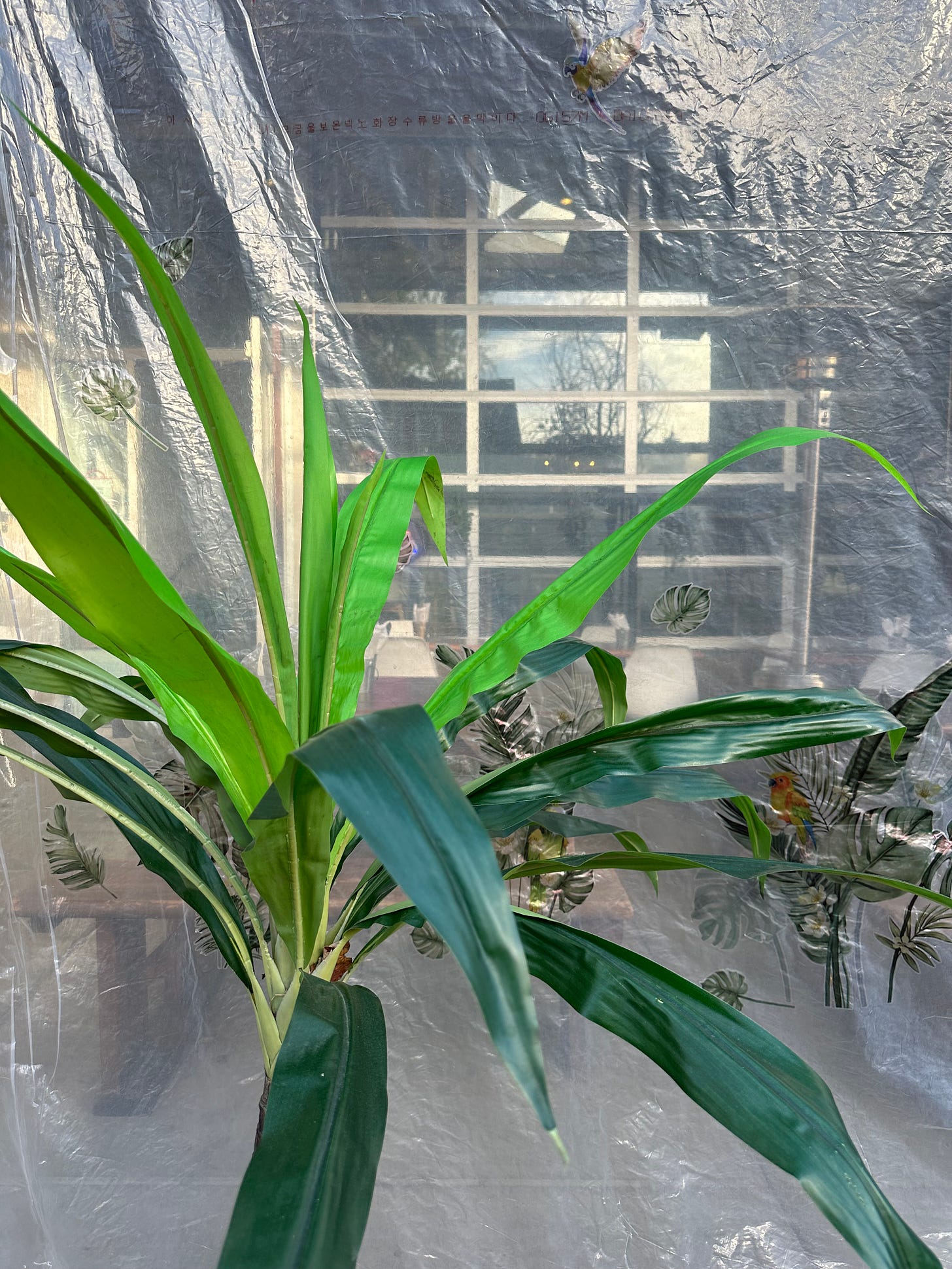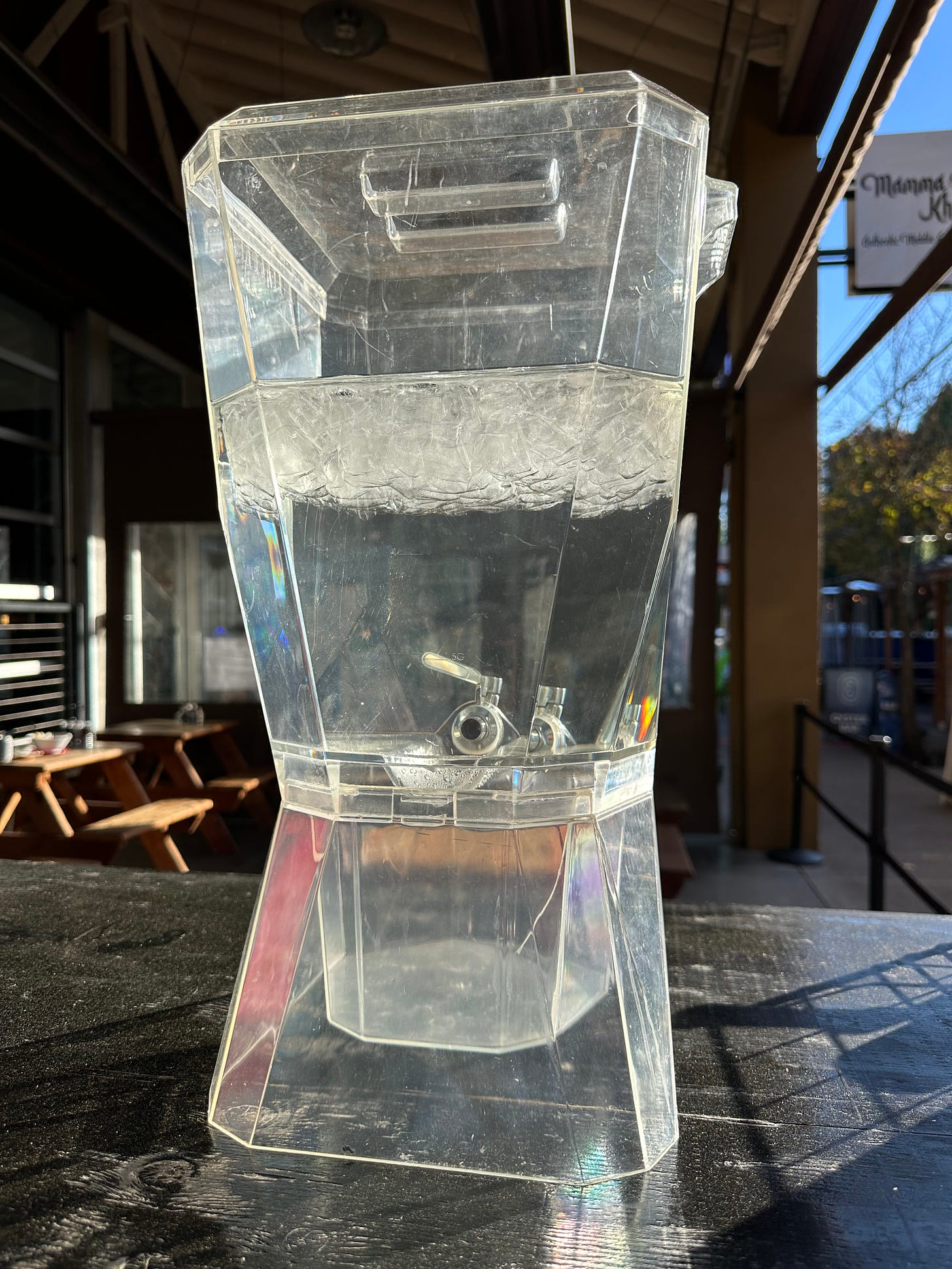Futurism Restated #88: Portals, Frames & Cross Sections
New releases from Carmen Villain, Mouse on Mars, Mukqs, and more
I’m back from a nine-day trip to Portland, where I was checking in on my mom. She’s in assisted living; her Alzheimer’s is progressing steadily. It isn’t, thankfully, the kind where she doesn’t know who I am, for instance, or at least it isn’t yet; in her case, her short-term memory has been profoundly affected, and her ability to make or retain them seems to get worse and worse, which generates a lot of confusion in general. (To wit: She thought my second day in town was my last day there, and then on my final day, she didn’t realize that I was leaving that morning, even though we’d discussed my departure date frequently.) From the smallest topic (what’s for lunch today?) to the biggest (“I want to be cremated”), if it was discussed once, it was discussed a dozen times, multiple times a day. The worst of it is the amount of anxiety that it’s causing her; she’s always struggled with anxiety, so it only stands to reason that this would create even more stress for her. I guess I’m relieved that the trip wasn’t harder than it was; we’re dealing as best we can. I ran—a new obsession of mine, since this summer—almost daily, which was good, including a trail run in Forest Park on my last full day.
It had been raining all day, but my weather app said that it was supposed to let up in the early afternoon, so around 3 p.m. I drove to the Wildwood trailhead and sat in my car for 15 minutes. It did not let up, and I was very close to turning around and going home. But then, having seen a few people coming off the trail—in much more extensive rain gear than I had, granted—I thought, Fuck it, and headed out. I’m so glad I did; it was one of those runs that feels physically freeing, like you’re shedding burdens with every step.
Normally I run with music—something I hadn’t been doing until I exchanged some emails with Ben Ratliff, who has a new book about running and listening called Run the Song coming next March—but this time I left the earbuds in my pocket, which was the right move. The sound of the rain, compounded by the dripping trees, created a kind of cocoon-like effect, a dappled white noise offset by the slap slap slap of sneakers on wet earth (and the occasional splash of a puddle I didn’t leap far enough to avoid).
On the days that I did run with music, I listened mostly to Klara Lewis’ fantastic new album Thankful, a tribute to her friend and mentor Peter Rehberg. (I reviewed the album for Pitchfork this week.) You might not think that it would make a good running soundtrack; it’s a collection of slow-moving ambient pieces in the spirit of the untitled third track from Pita’s Get Out. But I’m discovering that I like running to ambient music, or at least certain records. Like the Forest Park rainfall, it has a cocooning effect that wraps you up in the sound. And the jettisoning of song structure, combined with the extended track lengths, lets you forget about the passage of time and focus instead on the simple act of putting one foot in front of another.
This week’s recommendations include new releases from leftfield house oddball Matt Karmil; even more leftfield ambient maverick Mukqs; Carmen Villain, who pivots into exciting new terrain on her rhythm-infused new Smalltown Supersound EP; Brian Foote’s new /\Aught-adjacent label False Aralia; and more.
Today’s newsletter is free to read for all, thanks to the generous support of paying subscribers. Those kind souls are duly rewarded with access to exclusive playlists for chilling and clubbing (now at 25 hours and 19 hours long, respectively), the semi-regular Mixes Digest posts, and full access to the archives, including interviews with Belong, Seefeel’s Mark Clifford, Kompakt’s Michael Mayer, and more.
Record of the Week
Matt Karmil: No Going Back (Studio Barnhus)
When I think of Matt Karmil, I often think of his 2017 single “Can’t Find It (The House Sound),” a ruminative slice of deep-house perfection overlaid with a choice bit of dialogue from Curb Your Enthusiasm in which Larry David and his wife are lying in bed at night when they hear an unfamiliar sound. “What’s that noise?” Larry asks. “It’s probably just a house sound or something,” Cheryl replies, to which Larry fires back, anxiety rising in his voice, “A house sound? What’s a house sound?” Incorporated into a house track, that sample becomes the dumbest pun in the world, and it ought to cheapen the track, and yet the opposite happens—for me, anyway, this absurdist little vignette only deepens the song’s baked-in mystery; Larry David’s anxious voice just adds to the song’s strange pathos.
Karmil has been remarkably prolific over the years, turning out a lot of very slightly idiosyncratic—though never quite so overtly gonzo—house and techno, much of it for Smalltown Supersound. His new one for Studio Barnhus feels like his most unconventional record yet. Though the first track is a sweet, gliding, jewel-toned house track somewhere at the intersection of Smallville, Joy Orbison, and Lusine, it’s actually not terribly representative of the album as a whole, which is generally much stranger. The title track pairs ambient pads with thrashing drum machines and a chirpy vocal sample in a way that points toward anthemic horizons, yet refuses to completely deliver; there’s no bassline, for one thing, and the drums stop and start, undercutting any sense of forward motion. (To reference another cerebral sitcom, it gets off on being withholding.) “Old Haunts” is a skulking bass-music brooder that thrashes away beneath a heavy lead blanket, not so much Burial as Philip Jeck. Birdsong and traffic noise suffuse “The Last Time,” a gorgeous ambient-house miniature, and “Things Really Happen” surveys similar territory, this time letting in the merest sliver of techno hi-hats, like a thin beam of light slipping through blackout curtains. The clubbiest track, “Still, Something There,” is a disorienting highlight that slots in nicely along the unsettling sample-stretching and lumbering grooves of Kassem Mosse and the Workshop label. But just as you think Karmil’s finally hit cruising speed, he turns around and closes out the record with “15 mins,” a 15-minute (precisely) meditation on a single cloudy synth loop suffused in a vast landscape of rumble and buzz. It’s a wonderfully idiosyncratic record, right down to the fact that it’s 42 minutes long yet only has seven tracks, as though unwilling to commit to being an album or mini-LP. It’s clear that Karmil is doing exactly what he wants to do here, and all the more pleasurable for it.
Albums and EPs
Carmen Villain: Nutrition EP (Smalltown Supersound)
No stranger to curveballs, Carmen Villain keeps us on our toes yet again. Having been veering in an increasingly ambient direction over the course of her last few recordings, she veers back into beats on this heady three-tracker. “Disig” opens with an atmospheric head fake before slipping into a weird, wriggly 3/4 groove that feels a little like Thé Au Harem D'Archimède-era Villalobos crossed with Topdown Dialectic digital fuckery; it’s as sumptuously textured as it is thrillingly destabilizing. “Nutrition” smooths out the beat but digs into the same timbres of electronic log drums and bursts of white noise—calling it Pan Sonic on Príncipe is probably too reductive, but you get the idea. “Marka” slows the beat but sinks even deeper into the same palette, reminding me more than anything of Villalobos’ underrated “Fools Garden (Black Conga).” I love that all three tracks clearly spring from the same workflow and the same inspiration; I can’t wait to hear where she goes with this line of inquiry.
Mukqs: Eye Frame (Orange Milk)
What if ambient music didn’t have to be so placid? That’s Max Allison’s starting point on his latest album as Mukqs, in which synths and samples dissolve into a blur of vaporous textures; I listened on the plane at PDX as I watched an Alaska airlines jet touch down, kicking up clouds of spray, and the image perfectly matched the sounds in my earbuds. It’s not all so erratic; the gently pulsing “Hyperiaura” could almost pass for an R&S release from the 1990s, with its submerged 4/4 rhythm and aurora glow—at least, at the start of the track. By the end, jittery kicks are crumbling to pieces beneath ultra-bright digi-chimes. The press notes describe the album as “an hour-long subversion of ambient tropes,” which feels about right—but the end result isn’t at all academic, or, for that matter, overly polemical. It may be a record that refuses to hew to expectation, but it remains thoroughly immersive and entrancing—a ticket to the most pleasurable sort of bewilderment.
Mouse on Mars: Herzog Sessions (Sonig)
Mouse on Mars have terrible luck with soundtracks. Their 1998 album Glam is taken from the score to a Tony Danza/Ali MacGraw film—that detail never fails to tickle me—whose director ended up rejecting Mouse on Mars’ soundtrack, before his own film got the ixnay from the studio behind it. The newly released Herzog Sessions stems from a 2007 invitation to soundtrack a Werner Herzog film of their choosing for live performance. The only problem: The festival organizers did not, in fact, have the rights to the Herzog films in question. Mouse on Mars performed their live soundtrack twice and back it went in the drawer. I haven’t seen Fata Morgana, the 1971 film in question, so I can’t comment on how well the music fits the imagery, but as a standalone album, it’s prime ’00s Mouse on Mars, woozily shapeshifting across an unpredictable landscape of crunch and shimmer, curlicue and squeal. There’s something toylike about it all, as though they’d rigged up a room full of automata banging drums and thwacking on various bits of metal and plastic; their textures are battered and corroded, a riot of rust and termites and heat blisters. It’s freeform to the extreme: The opening track alone is 14 minutes long, and zigzags through whizzing abstractions, dubbed-out downtempo suffused in R2D2 bleeps, krautrocky ecstasy, and a long, fizzy denouement of bubble and scrape. More than any other artist, Mouse on Mars leave me completely mystified as to how they actually make their music; none of the usual processes seem to apply. That’s always been the case with them, and it remains beautifully, anarchically true here too.
Tristan Arp: a pool, a portal (Wisdom Teeth)
When I interviewed Objekt for Pitchfork not long ago, we talked about his hyper-detailed approach to sound design—a reflection, he says, of his meticulousness in virtually every aspect of his life. Tristan Arp has a similarly detail-intensive approach to production, but unlike Objekt’s sharp, metallic attack, Tristan Arp’s ultra-vivid rendering is soft and rounded at the edges, like a flower garden viewed in extreme hi-def. Like many of his Wisdom Teeth colleagues, Arp strikes a balance between tone and pulse in which the rhythmic is melodic, and vice versa: Piano is as much a percussive instrument as a lead on “invisible cities,” and on “life after humans,” samples of voice and keys and percussion scatter like drops of water in an oiled skillet. He’s steadily expanding the dimensions of his sound: “ways of being,” featuring vocals from Mabe Fratti, is the most songful he’s ever sounded, while the sculpted feedback and rippling blips of “time dilation”—a sort of accidental drum & bass banged out on pinball flippers–got me thinking about Mouse on Mars, and Oval, and Nuno Canavarro. It’s a richly colored, pointillist sound.
Jack J: Blue Desert (Mood Hut)
I thought I was over the Korg M1 organ bass, and for the most part, I really am, but I’ll give a pass to Jack J, who puts it to fine use on the opening track of his new album: “Wrong Again” has the M1 bass and one of those shuffly, downbeat/breakbeat house grooves of the early ’90s—a period piece through and through—but what sells it is how convincingly, and how sweetly, he delivers the song’s close-harmonized vocal melody. “Foolish Man,” which appeared as a single a couple years ago, does a similar dance around the retro-not-retro vibes, and again succeeds on the strength of its songwriting, swirling together Erlend Øye, Superpitcher, and yacht rock into one sleek, melancholy package. Whatever Mood Hut’s reputation as an underground dance label, there’s really precious little house music here; it’s an album of Bullionesque pop at heart— “At My Door” might be a riff on Sarah or Postcard; “At Last” has a lovely Pet Shop Boys vibe—driven home by Jack J’s vocal confidence and melodic skills. An indispensable choice for playlists for the car.
Zero Key: Zero Key (False Aralia)
Selfsame: Selfsame (False Aralia)
Brian Foote’s Peak Oil label was my introduction to the work of Topdown Dialectic, and discovering them sent me tumbling down the rabbit hole at /\Aught, the shadow label responsible for the majority of the artist’s pre-Peak Oil releases. The identity of most of /\Aught’s artists has never been any clearer than that of Topdown Dialectic, but Foote’s new label shines at least some light in that direction: False Aralia is billed as “a series of recordings growing in all directions, cataloging the work of a group of north american collaborators centered around the studio practices of izaak schlossman (of aught, s transporter, loveshadow etc.) and facilitated by brian foote (of peak oil, kranky, etc.).” False Aralia’s first two releases are both billed simply to “IS,” and both feature the same resolutely anonymous self-presentation: black-and-white abstractions for the covers; serialized eponymous titles; etc. Fans of /\Aught (and Topdown? I’m still not certain if that’s Schlossman, or someone else) will certainly detect the label’s hallmarks in these records’ fuzz and murk. The Zero Key EP offers four variations on a grainy dub-techno theme, pairing Pole-like lurch with vaporous, Vainqueur-esque filter play, and indulging in the yen for disappearance so central to vintage Vladislav Delay. The Selfsame EP does much the same; the sounds reappear from track to track, but their balance and proportions vary, from the buoyant, half-time bounce of “Selfsame 01” to the Chain Reaction shuffle of “Selfsame 04” and the Studio Eins stomp of “Selfsame 04b.” Ghostly hints of vocals, credited to Anya Prisk (aka Anya Dross, Schlossman’s partner in Loveshadow and S Transporter) on both tracks, drive home the Luomo comparison, lending a warmly human quality to counterbalance the air of digital disintegration.
Shoeg: Cross Section (Arkestra Discos)
Barcelona’s Carlos Martorell unleashes a dizzying onslaught of hyperdigital textures and taut rhythms. Oneohtrix Point Never, SOPHIE, Foodman, and RRUCCULLA are all clear points of comparison, but Shoeg’s head-over-heels tumble and baroque footwork are imbued with a manic energy and timbral character that’s all their own. Beyond the exhilarating sound design, what I appreciate most is the compositional sensibility here, especially in the three-part “Study on a Cross Section.” Gonzo zaps and rubberized laser timbral hybrids are a dime a dozen these days, yet Martorell always puts even his most audacious sonic manipulations in the service of good old fashioned storytelling.
Balmat News
Luke Wyland: Kuma Cove (Balmat)
Balmat’s next release is out Friday, Nov. 1, and I couldn’t be more excited about it; I’ve spent many, many hours listening to this, a lot of them looking out over green farmland while my daughter is in her piano lessons (which she takes in a farmhouse; I walk the fields and watch the cows for an hour). I first discovered Luke’s work through his group Methods Body, with drummer John Niekrasz—their 2020 self-titled album is highly recommended, as is 2023’s Plural Not Possessive—but Luke’s solo debut under his own name is a considerably different affair, using live-in-the-studio processes to explore ideas around repetition, temporality, the cadence of disfluent speech (a facet of his experience as a person who stutters), and, on a simpler level, a flat-out gorgeous tonal sensibility. It always feels good to bring a Portland artist into the fold at Balmat, and I’m thrilled that we’re able to give this record a home.
Recommended Reading
Andy Beta on Irena Havlová and Vojtěch Havel
I was lucky to visit Prague in 1994, and I vividly remember buying a CD of Irena Havlová and Vojtěch Havel’s Malé Modré Nic (Little Blue Nothing), which I heard playing in a café. For years, I was certain I was the only person who had ever heard of them; later, I’d discover that they had a considerable cult fanbase that included Sufjan Stevens and the National’s Bryce Dressner. Vojtěch Havel died this month; Andy Beta, who reviewed their 2021 album Melody as Truth album Melodies in the Sand for Pitchfork and later became acquainted with the couple, pens a moving tribute to the couple and their music.
Jody Rosen on Ka
I know we’re mad, rightly so, at the Washington Post’s refusal to make a presidential endorsement (apparently at the behest of owner Jeff Bezos); lots of people have canceled their subscriptions, but I decided not to, because I want to keep supporting the good journalism and criticism that folks like Chris Richards do. (It seems like canceling one’s Amazon Prime subscription would be a more direct response to Bezos—although, I also realize, a minuscule drop in the bucket of his boundless revenues.) In any case, Jody Rosen recently wrote a powerful remembrance of Ka, the peerless Brownsville rapper who died this month at the age of 52.
https://www.washingtonpost.com/entertainment/music/2024/10/21/ka-rapper-death-tribute/
That’s all for this week—thanks for reading!











Always look forward to these weekly record posts. Your choices for Record of The Week are always amazing (this Matt Karmil is brilliant). Thank you!
Thanks for the reminder – bought the Klara Lewis and Carmen Villain on Bandcamp without even listening, will check out the rest for sure.